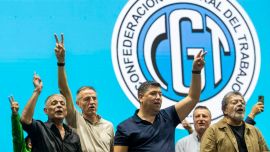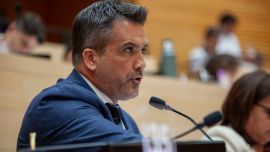Prosecutors in Bolivia's capital issued an arrest warrant against ousted former president Evo Morales on Wednesday, accusing him of “sedition, terrorism and terrorist-financing.”
Public prosecutors in La Paz signed a warrant for police to detain the 60-year-old and take him to the Attorney General's Office.
The government of Jeanine Añez, which took power after Morales was ousted by the military last month, has repeatedly accused the former leader of trying to foment unrest from exile.
Interior Minister Arturo Murillo posted the arrest warrant on Twitter.
The allegations against him stem from an audio recording. In it, Morales allegedly tells one of his supporters to block trucks and interrupt the food supply to several cities. Morales was in Mexico at the time, the complaint alleges.
The former trade union leader denounced the arrest order as "illegal, unfair and unconstitutional" on Twitter.
"I'm not worried, as long as I'm alive I'll continue with greater strength in the political and ideological struggle for a free and sovereign Bolivia," he said.
Authorities allege Morales promoted violent clashes that led to 35 deaths during disturbances before and after he left office. Officials say he ordered supporters to blockade cities in order to force the ouster of Áñez, who took over when Morales resigned on November 10 after a wave of protests and under pressure from the police and military.
Morales fled Bolivia in November, flying first to Mexico. He is currently in Argentina, after President Alberto Fernández's government granted him asylum. At a press conference in Buenos Aires this week, Morales called for new elections and reiterated that he won’t run as a candidate. He has repeatedly denied the charges as a setup.
The Fernández government says Morales was ousted illegally in a coup, which is also the position of the governments of Mexico, Venezuela and Cuba.
US President Donald Trump, on the other hand, applauded Morales’s ouster and praised the Bolivian military for defending the country’s constitution.
Morales said Tuesday he would campaign for the presidential candidate of his party in elections expected within the next several months, though a date has not been set.
"I'm convinced that we'll win the next elections. I won't be a candidate but I have a right to be in politics," Morales told reporters.
The candidate from Morales' Movement Toward Socialism (MAS) party is yet to be chosen, and the former president cannot run in the new elections.
Bolivia's first indigenous president has described the movement that pressured him to leave as a coup d'état.
Critics of the long-ruling leader had accused him of using fraud to win a fourth straight term in office in an October 20 vote, An audit by the Organisation of American States backed up the allegations, saying it found evidence of vote-rigging.
Morales retains a strong following in Bolivia. The interim government has expressed concern that Morales could use Buenos Aires as a campaign headquarters and might plot his return home.
"My obligation now that I'm not a candidate, now that I'm not president, is to accompany candidates so that they can win the elections," he said Tuesday
Previously he insisted he'd been the victim of a coup and has launched near-daily Twitter attacks against Añez and her allies.
Earlier on Wednesday he claimed US President Donald Trump – who hit out against Morales on Tuesday for provoking violence in his country from afar – was behind the "coup."
Morales quit after weeks of protests by opposition supporters, over accusations that he committed fraud in the October 20 election, claims that were strengthened by a report by the Organisation of American States (OAS) which found irregularities in the election.
The Añez government said it will organise new elections, but hasn’t yet set a date. Many Bolivians regard the government as illegitimate, since it wasn’t elected.
S&P Global Ratings this month lowered the country’s outlook to negative, saying that “uncertainty caused by national elections and the change in political leadership has weakened Bolivia’s macroeconomic pillars.”
Moody’s Investors Service also cited heightened political risk when it put Bolivia on downgrade review this month.
– TIMES/AP/BLOOMBERG



















Comments